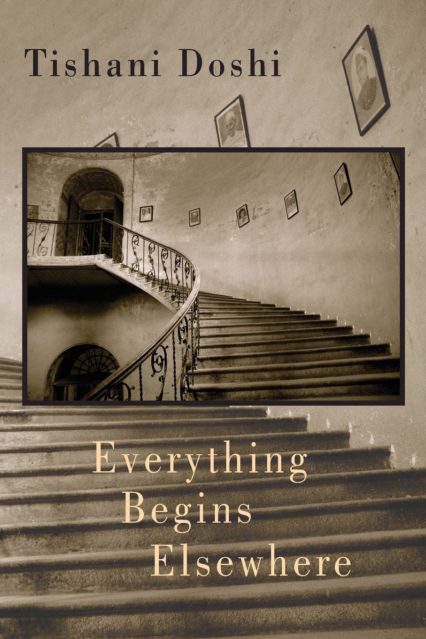Ahead of the release of Everything Begins Elsewhere, poet Tishani Doshi chats to Wales Arts Review’s Carl Griffin about her craft and inspirations.
In your debut novel, The Pleasure Seekers, the concepts and characters are clearly inspired by your parents and their relationship. Your mother was from Wales, your father from India, the interesting aspect being that she was from somewhere other than India, not Wales itself. Has Wales physically had an impact on your writing work, and has it, physically or culturally, had an impact on your poetry?
Tishani Doshi: In very subtle ways, yes, it has. I do think that the place where you’re born and where you grow up (in my case, India) has the ability to monopolise you culturally and emotionally, but having another place that you can claim some connection to offers a freedom – a dimension that not everyone has the fortune of having (although my English friends don’t always think of my half-Welsh heritage as particularly fortunate). I think it does matter that my mother is from North Wales, because if she were from Denmark or Italy, or even England, it would have altered the landscape of my childhood imagination.
Nercwys, North Wales, is where I used to go for summer vacations as a child – that one-street village, that playground, those houses, those accents. All of it lay in direct opposition and contrast to my life in Madras. I remember one summer going the beach in Rhyl, sitting with anoraks on ponies, a pebble beach, the wind howling around. So very different from the long sandy Marina Beach of Madras where thousands of families gathered on balmy Sunday evenings to walk the promenade. So, just in the idea of beach, there is a duality, two realities. And I think, for me, having the space for that kind of duality has been important in everything I do – poetry and prose.
How does India give your work a different flavour to the work of other poets?
Tishani Doshi: It’s hard not to be affected by India especially because of the richness of narrative tradition that exists in the form of myths, stories and poetry. But this narrative tradition also extends to the everyday life that’s being lived around you. If you ever suffer writer’s block in India, all you need do is walk down the street and there will be hundreds of stories playing out in front of you. I may be biased, but I do believe that India has a rare vitality.
For many years I worked with a wonderful Indian choreographer, Chandralekha, and she once said to me: ‘Don’t think of yourself as a young woman, think of yourself as an ancient woman of this land’ … It was a beautiful thought; one that I think works in India because there is a sense of continuity in life, religion, civilizations – that you are always surrounded by. And with all the loneliness that the writing life brings, it’s quite uplifting to feel you’re not alone. That you are walking alongside the ancients. That you may even be learning from them.
What is the poetry scene like in India? Are there any good poets writing at the moment (preferably either writing in English or translated into)?
Tishani Doshi: That’s a hard question as there isn’t just one scene. I belong to the English language poetry scene, which is pretty low on the Indian literary pole. Unfortunately, it’s the only space from which I can speak, and from here, I’d have to say it looks pretty scattered; vibrant in parts and jaded in others. The contemporary poets I read and return to are: Jayanta Mahapatra, Arundhathi Subramaniam, Meena Kandasamy, Vivek Narayanan, Jeet Thayil, Karthika Nair, Robin Ngangom, Keki Daruwalla & Adil Jussawalla. I’m also looking forward to a new bilingual anthology of Tamil women’s poetry called Wild Girls, Wicked Words, translated and introduced by Lakshmi Holmström.
You were at the Poetry Parnassus last summer. What was it like?
Tishani Doshi: I think Simon Armitage had a wonderful vision. Not just to bring so many poets from around the world in one place – speaking in their various tongues – but because it was an interesting counterpoint to the sporting Olympics. It really went to show how far apart discus-throwing and recitation stands in our culture today (quite far). Jude Kelly, the Artistic Director of the Southbank Centre, said something very interesting in her opening address. She said that poetry is an art that remains truly subversive in a product-driven age where culture has become something of an ‘intense picnic for the public to snack and browse on.’ She said the poet’s ability to speak truth hasn’t been tampered with because poetry carries no cash with it, and so people instinctively trust it. Compared with the corruption and big money involved in sport today, I thought it was a very valid point.
My favourite event at the Parnassus was the Rain of Poems by the Chilean art collective Casagrande. They organised to bomb London with a hundred thousand poems from a helicopter above the London Eye. The poems were written by poets from 204 Olympic nations. It was quite a sight. There were hundreds of people racing across the grass, trying to catch hold of these slivers of paper – some had no idea what they were running for but it certainly brought out the competitive spirit in everyone. I was tearing about in a sari battling with a young man for a poem. I won. The young man looked quite disappointed and dejectedly asked if he could see what it was. I handed him the paper. It was a poem from Tajikistan called ‘Behind the Mass of Green’. He looked at it and handed it back. ‘Oh,’ he said, ‘It’s nothing.’ It was an instant and vicious declaration on the state of poetry. But I’d like to think that for every hundred of those, for whom poetry has no place or magic in their life, there might have been one who was calmly walking along, and a poem that had been stuck in a roof for days fluttered down to find him. And, perhaps, when he caught it he was not disappointed. He might have considered it a gift from the sky.

In your 2011 talk, The Luxury of Slowness, you talked about the connection with slowness and speed and how, for a few weeks each year, you like to escape to the hills and that the slowness you gain there gives a fresh quality to your writing. If slowness is the only luxury we have left, would too much of it have the opposite effect? And why does poetry require a slow lifestyle to be appreciated?
Tishani Doshi: I have taken the slowness idea to another level now. I’ve moved out of Madras to live between two fishing villages by the sea, with no television and very dodgy internet connection. Sometimes two weeks go by and I haven’t gone out of the front gate. I don’t have the newspapers so there’s no need to get depressed on a daily basis, and this sort of cocoon-lifestyle – I know I couldn’t sustain it indefinitely, but it’s much easier to do than most would think – in fact, it’s a luxury. To breathe clean air, to not have the noise of the city, the garbage, the pollution, the constant movement.
This isn’t to say that I’m not seduced by speed when I come in contact with it. I love the brush with crazy frenetic living as long as I can step back to my cocoon – because that’s the space where I can think and write. Ultimately, it’s trying to find the balance between moving and keeping still, slowness and speed … But this idea of slowness as a luxury, it came from a remark that Henri Cartier-Bresson made after seeing one of Chandralekha’s dance performances in Avignon. He said, ‘Slowness, such slowness! I believe slowness is the only luxury we have left.’ I think the power of this statement comes through in the fact that you cannot understand or have a handle on speed unless you have understood and lived a while in slowness. Think of music: you cannot arrive at the crescendo right away.
Without the slow building up, the crescendo is just noise. As for poetry, I think one of the reasons why it does not have the large audiences it should, is because while it is the most concise and distilled of all literary forms, it contains within it many layers of slowness. If you arrive at it like a speed train just waiting to hear the crescendo, you may not hear it.
As a poet and novelist, are you able to write poems while working on a novel? Do you find working on one thing gets in the way of the other? How do you cope with this multi-tasking?
Tishani Doshi: I’ve always encouraged a non-compartmentalised lifestyle, so while it might have been practical to have chosen a genre and stuck with it, I like the fluidity and freedom of moving between them. I’ve described the different forms of writing as love affairs; for me, poetry is the first stage of love, the obsessive love, prose is the long and, hopefully, fulfilling marriage and journalism is the one-night stand. Obviously, it’s impossible to cope with all three, but I try.
Having completed one novel, is it easier or harder to write, or think about, the next? And what is next for you?
Tishani Doshi: Completing novel number one – and I don’t just mean writing it, but finding an agent and a publisher and actually seeing it out into the world – is quite a conflicted experience. I expect it’s how people might feel about children. There’s so much love and effort and pain that goes into the whole process, and when it’s finally done, you’re all emptied out and happy-but-morose and, after that, you think, do I really want to go through it all again? Eventually, for me at least, I did, but not right away.
I was quite content to fall back to poetry because it felt like safer ground for me; the stakes weren’t as high, because you can work on poems individually for a long time before needing to think about them as a collection whereas, with the novel, there’s all this continuity. Page after page of it. It can be exhausting. At the moment I’m working on a novella commissioned by Seren. I’m retelling a tale from the Mabinogion – ‘The Lady of the Fountain’ – and it’s been a wonderful bridge back to prose, while allowing me to explore my Welsh connection, however tenuous.
Tishani Doshi’s latest collection Everything Begins Elsewhere, published by Bloodaxe, is available now.
Header Photo Courtesy of Carlo Pizzati.












